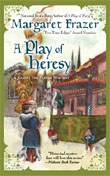CHAPTER 1
The day was dove-gray, soft under low clouds, with the rain mist-gentle on Joliffe’s face and beading silver on his horse’s dark mane. His cloak was a long way yet from soaking through nor had he troubled to pull up his hood; the rain felt good against his face. Too, he judged by blue patches of sky showing in the east that clearing weather was on the way and there would likely be sun enough to dry his hair and cloak well before he came to Coventry, especially since he was making no hurry of his going…
In the opening chapter of A Play of Heresy, I wanted to layer in some details of the spy-work Joliffe had been at before the story starts, both to give a sense of what sort of man he is and build a feeling for the reader of the wider world beyond the circle of the book’s immediate action. In historicals, this sense of the wider world is useful in making sure the characters are seen as existing in a complex context, not simply in the narrow bubble of the story. In this case, rather than rather gratuitously resorting to mention of unrelated famous events of the time with no bearing on the story (to be avoided at all costs, in any case), I enjoyed involving Joliffe in more local – but no less real – issues among the region’s gentry and lower nobility, at just the level Bishop Beaufort could make best use of his skills.
Happily, I had my notes from Christine Carpenter’s Locality and Polity: A Study of Warwickshire Landed Society, 1401-1499 and her article “The Beauchamp Affinity: A study of bastard feudalism at work” (English Historical Review xcv, 1980) to draw on for all the details I needed (and more).
Interestingly, this isn’t a book or article I had just read, or even read specifically to use for A Play of Heresy. In fact, I read them a good many years ago simply because they cover the period in which I’m particularly involved and would serve to add to my layers of my knowledge about the time and people. I didn’t know if I would ever have particular use for what I read, but this is what it’s like for a fanatic researcher – reading and studying not simply what seems to be needed for your immediate purpose but everything that comes to hand, because you never know what, at some point, will suddenly be of use.
Besides – all right: I’ll admit it – I find this sort of reading-for-research just out-and-out plain fun!
– Margaret
Follow the virtual bookclub for A Play of Heresy on Facebook and Twitter.

















December 10th, 2011 - 8:44 pm
I was interested in the portrayal of Joseph as an old man and a subject of ridicule. I have always seen him represented as a young man about the same age as Mary with no ridicule involved. When did these versions of Joseph evolve and why? Why the change.
December 11th, 2011 - 9:46 am
Gayle, I wonder if this portrayal of Joseph is a way to enliven or humanize the Biblical story for an audience. Presenting Joseph as an old man puts him in the same category as the classic cuckold figure, and can make the audience laugh.
As for the first chapter, I wonder, are we (and Joliffe) meant to trust Sebastian? Chaucer was fond of describing his pilgrims so that their outward appearance reflected their inward nature, and here in Sebastian we have a man who looks like a rat. I suppose any spy could be considered a rat, so perhaps Sebastian is not particularly treacherous. Joliffe thinks he’s a bit gaga about Lollards, but is there something more sinister at work?
December 11th, 2011 - 12:04 pm
Gayle, I don’t know when the change in portraying Joseph came. That would be interesting to trace. The idea of him as an old man was firmly established in medieval times, though. One version of the ancient “Cherry Tree Carol begins “Joseph was an old man, And an old man was he, When he wedded Mary in the land of Galilee.” In another carol he protests, “If she be with child, It is not by me,” which takes up the cuckold theme. But always, before the end, in play or carol, he gives his loving care to Mary and the Child. So there’s a pleasing character arc allowed him!
As for Sebastian — I’m not going to say a thing. It would be indiscreet of me at this point.